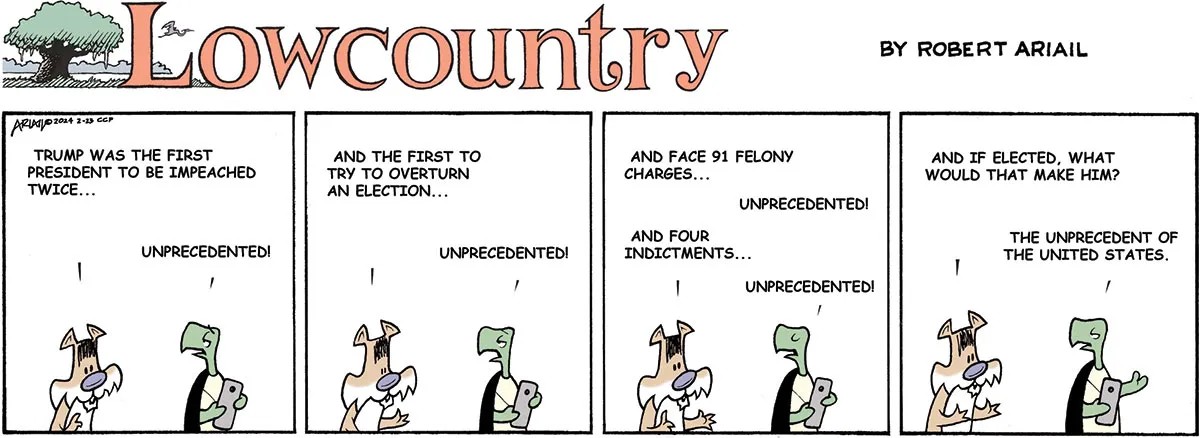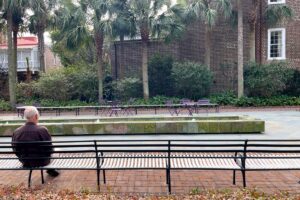STATEHOUSE REPORT | ISSUE 23.08 | Feb. 23, 2024
BIG STORY: Officials at odds over management of education lottery
MORE NEWS: Open carry gun bill still stalled over details
LOWCOUNTRY, Ariail: Unprecedented!
COMMENTARY, Brack: Here’s the path for Haley to win in South Carolina
SPOTLIGHT: Charleston Animal Society
MYSTERY PHOTO: Glass box
FEEDBACK: Two views on medical marijuana
Auditors, officials differ on management of state’s education lottery

By Jack O’Toole | A state auditor’s investigation is reporting significant evidence of mismanagement at the South Carolina Education Lottery (SCEL), including lax oversight of retailers, missing or incomplete employee records and, in at least some cases, a failure to conduct legally-required criminal background checks.
But state lottery officials hotly disputed the findings in a formal agency response, which is included in the auditor’s final report.
South Carolinians rely on the lottery to provide more than $500 million a year in funding for students, schools and colleges throughout the state.
The S.C. Legislative Audit Council (LAC) this week issued the 94-page audit. It includes interviews with SCEL employees, payroll records, data collected from SCEL’s customer relationship software, and independent reviews of relevant laws, regulations and best practices from around the country. In total, it offers 40 specific recommendations to improve the lottery’s operations and administration, while noting that only two of the 40 recommendations it has made in previous lottery audits have been fully implemented.
“Our job is to provide recommendations for improvement,” lead auditor Tammy Saunders said in an interview. “And that’s what we feel like we found – areas where improvements could be made in the oversight that the lottery has over its retailers and, of course, in the Human Resources area.”
Poor retailer oversight and HR problems
The audit discovered major deficiencies in the lottery’s practices and procedures related to retailer oversight. Specifically, it found the lottery fails to consistently conduct undercover retail compliance visits, fails to ensure those visits take place in all S.C. counties and fails to investigate retailers that may have been involved in misconduct.
Furthermore, auditors were unable to determine what actions lottery officials would typically take in cases of proven retailer misconduct or whether those actions were ever implemented in any particular case.
The report warns that SCEL “needs to improve its oversight of lottery retailers to preserve the integrity of the lottery.”
The audit also spotlights a number of human resources (HR) problems, including the lack of a formal HR manual, a failure to consistently perform name-based criminal background checks prior to hire as required by law and a complete lack of employee reviews from 2009 to 2022. In addition, the audit found that lottery officials never notified eight employees that their personal information may have been compromised when their personnel files were lost and failed to maintain documentation to justify pay increases.
“A fundamentally flawed report”?
In a sharply worded response, lottery officials strongly disputed the audit’s findings.
“Several of the LAC’s recommendations are either misleading or propose a solution to a problem which the LAC has failed to make evident in its audit report,” the response said. “The audit report, and more particularly the processes employed to conduct the review, is fundamentally flawed. Regrettably, the LAC audit procedures led to a final report replete with factual errors that directly lead to inaccurate findings and recommendations.”
For instance, lottery officials say auditors were provided with clear evidence of undercover compliance visits that the final report claims never happened. In addition, it states investigators received a copy of the agency’s 514-page HR manual during the document production process – an HR manual the audit says does not exist.
Such a pattern of “factual errors” and “material misrepresentations” throughout the report “calls into question the verity of the audit council’s core findings,” lottery officials wrote.
But the LAC said it stood by its findings and recommendations.
“We have an excellent system of quality management control within the agency that ensures our reports are accurate,” said Saunders. “So yes, we stand by that.”
The audit, which was prepared for the General Assembly, will be made available to Gov. Henry McMaster and members of the state legislature for further review and consideration of its recommendations.
- Jack O’Toole reports on statewide issues for Statehouse Report and the Charleston City Paper. Have a comment? Send to: feedback@statehousereport.com.
Open carry gun bill still stalled over details

Staff reports | Progress on open carry gun legislation remained stalled in the S.C. General Assembly this week as infighting among gun-rights groups over differences between the House- and Senate-passed versions of the bill threatened to derail the measure.
Dubbed “constitutional carry” by supporters, the legislation would allow South Carolinians to carry handguns openly or in a concealed fashion without a permit, with specific exceptions for facilities like schools, hospitals and public buildings. Both versions of the bill would also stiffen penalties for certain firearms offenses, including unlawful possession of a gun – provisions that many saw as key to muting local law enforcement officials’ oft-stated objections to the proposal.
Proponents say the bill would simply bring South Carolina into line with the majority of U.S. states that already allow open carry, while opponents argue that the laws in those states are often quite different from the proposed South Carolina legislation. For instance, in Pennsylvania where open carry is generally allowed, Philadelphia is specifically exempted due to its high population density. No such geographical exclusions exist in either the state House or Senate versions currently under consideration.
But with large majorities in both chambers favoring open carry in principle, the real sticking points are a series of National Rifle Association-approved Senate amendments that have drawn the ire of less compromise-oriented groups such as the National Association for Gun Rights and its state affiliate, Palmetto Gun Rights (PGR). Those amendments include provisions that would increase penalties for carrying a gun in restricted locations, require the state to provide free monthly gun training classes in all 46 counties, and allow members of the legislature to carry in restricted locations without penalty.
“We are tired of the compromises,” PGR executive director Tommy Dimsdale said in a recent video. “We are tired of waiting, we are tired of backroom deals, and we are tired of South Carolina Republicans circling the wagons around their colleagues, weakening good bills so that weaker members get to vote on them and pretend that they are pro-gun.”
With the two chambers seemingly deadlocked over the Senate amendments, a conference committee with members from both bodies will try to find a workable compromise as quickly as possible.
“I haven’t heard that there’s going to be any effort to delay the conference committee meetings,” said Senate Majority Leader Shane Massey. “I think everybody would like to work out the issue if we can.”
- Have a comment? Send to: feedback@statehousereport.com.
Unprecedented!

Award-winning cartoonist Robert Ariail generally has a biting or funny comment about the great state of South Carolina in his weekly cartoon. This week, he takes a different look at the politics related to former President Donald Trump.
- Love the cartoon? Hate it? What do you think: feedback@statehousereport.com.
Here’s the path for Haley to win in South Carolina

By Andy Brack | For Nikki Haley to win Saturday’s Republican presidential primary in South Carolina, she’s going to have to count on two groups that never really counted on her — Democrats and independents.
 But with former President Donald Trump constantly yammering about a $355 million fraud judgment, continuing to glorify Russian President Vladimir Putin and hawking $400 gold tennis shoes, maybe the level of frustration has grown so much that Haley will defy the polls.
But with former President Donald Trump constantly yammering about a $355 million fraud judgment, continuing to glorify Russian President Vladimir Putin and hawking $400 gold tennis shoes, maybe the level of frustration has grown so much that Haley will defy the polls.
Thanks to South Carolina’s open primary system, there’s a real path for our former S.C. governor, who served as Trump’s United Nations ambassador, to win.
It’s clear something is going on here that’s a little different than what’s in the horse race of the daily news headlines. People at restaurants, coffee shops and festivals — anywhere that anyone will listen — are urging Democrats and independents to vote in the Republican primary. And more Republicans seem to be jumping on Haley’s bandwagon. One Seabrook Island lawyer, for example, on Saturday related how he voted twice for Trump but no longer can: “He’s lost his mind.”
The formula for Haley to win in her home state starts with separating the pool of 3.2 million registered voters. Of those, only about 130,000 cast ballots in the Feb. 3 Democratic primary, leaving more than 3 million people in South Carolina who haven’t voted yet. But they can, thanks to the state’s open primary law. All of those folks – including Democrats and independents – are eligible to vote Saturday — a quirk in state law that committed Republicans hate with a passion.
Eight years ago when both parties had competitive primaries here, just under 750,000 voters cast ballots in the six-way GOP presidential primary. Consider this number to be the Republican base of likely voters now since there weren’t a lot of crossover votes in 2016 when Democrats had a competitive primary, too.
Polls currently show Trump having support of 65% of likely voters (meaning Republican ) voters. That means he can expect to get 500,000 the GOP base vote to Haley’s 250,000.
But remember: There are about 2.3 million other registered voters in the Palmetto State. If just 15% of that non-base group of frustrated Democrats, disillusioned independents and weaker Republicans who didn’t bother to vote in 2016 actually cast their lot with Haley, she could win.
Likely? Probably not. But lots of South Carolinians are praying for Trump to stumble. All the while, they’re muttering the state’s Latin motto, “Dum spiro spero.” Translated, that means, “While I breathe, I hope.”
Andy Brack is editor and publisher of Statehouse Report and the Charleston City Paper. Have a comment? Send to: feedback@statehousereport.com.
Charleston Animal Society
 We’re pleased today to shine our spotlight on the Charleston Animal Society, leader in the effort to make Charleston County a safe place for animals. Now the society is working to expand its Charleston success statewide to energize the state to reshape its 300-plus shelters and animal organizations into a no-kill network that stretches from Walhalla to Little River to Daufuskie Island.
We’re pleased today to shine our spotlight on the Charleston Animal Society, leader in the effort to make Charleston County a safe place for animals. Now the society is working to expand its Charleston success statewide to energize the state to reshape its 300-plus shelters and animal organizations into a no-kill network that stretches from Walhalla to Little River to Daufuskie Island.
Safe and healthy communities, neighborhoods and families don’t just happen – they’re built. “No Kill – No Harm – No More” shines a spotlight on animal abuse and family violence, which are often perceived and treated as separate issues. However, animal abuse is often the tip of the iceberg to larger issues in the home, such as child abuse, elder abuse or domestic violence.
- South Carolina’s most honored charity four years in a row
- National model for success
- Southeast’s only AAHA-accredited combined clinic and shelter
- Focused on solving problems rather than reacting to them year after year
- Publishes Carolina Tails, the largest pet magazine in S.C.
- No Kill. No Harm. No More. is a “movement” comprised of two major initiatives: No Kill Charleston and No Kill South Carolina.
- Learn more about the Charleston Animal Society and its work to create a network of humane network for the animals that bring joy to our lives.
Glass box

Here’s a glass box structure fronted by a garden somewhere in South Carolina. Yep, it’s pretty modern, but where is it? Bonus points for anything else about the structure. Send us your guess as well as your name and hometown to feedback@statehousereport.com.
 Last week’s photo of a guy on a bench in a park shows Charleston’s Theodora Park at the corner of George and Anson streets.
Last week’s photo of a guy on a bench in a park shows Charleston’s Theodora Park at the corner of George and Anson streets.
Allan Peel of San Antonio, Texas, offered this summary: “The park was designed by a local landscape architect, Sheila Wertimer, who was inspired by the design concepts used in the small Paley Park on 53rd Street in New York City. The centerpiece of the Theodora Park (and the mystery photo) is a 32-foot-long fountain pool made with 350 handmade ceramic tiles by the noted artist Paul Heroux. The park was named after [Charleston resident David] Rawle’s mother, Theodora C. Rawle (1912 – 1985), and was officially opened to the public at a dedication ceremony on June 5, 2015.”
Congrats also to these photo sleuth regulars for identifying it: George Graf of Palmyra, Va.; Jay Altman of Columbia; David Lupo of Mount Pleasant; Pat Keadle of Wagener; and Don Clark of Hartsville.
- Send us a mystery picture. If you have a photo that you believe will stump readers, send it along (but make sure to tell us what it is because it may stump us too!) Send to: feedback@statehousereport.com and mark it as a photo submission. Thanks.
Excellent article on medical marijuana
To the editor:
![]() Thank you for your article on the medical marijuana bill going through the S.C. legislature. Until I was diagnosed with Stage 4 cancer, I did not understand the relief that medical marijuana can provide.
Thank you for your article on the medical marijuana bill going through the S.C. legislature. Until I was diagnosed with Stage 4 cancer, I did not understand the relief that medical marijuana can provide.
If a cancer patient is unable to secure medical marijuana for pain relief and sleep aid, the patient is then forced in many cases to use opioids or suffer. Also when it is not available through a legal dispensary, there is real concern re: what is in the product.
– Name withheld upon request, Mount Pleasant, S.C.
Disagree on need for medical marijuana
To the editor:
Had you done the research, I don’t think you’d be advocating for passage of the Compassionate Care Act. Vaping, eating, or otherwise consuming marijuana products does not make them medicine.
The scam of “medical marijuana” started in 1974 when the National Organization for the Reform of marijuana laws started advocating for the legalization of recreational marijuana. …
Getting high on marijuana can no doubt divert attention from one’s aches and pains. So can a bottle of Johnny Walker Black Label. But that’s not medicine either. As for pain, the reason most people seek medical marijuana, I have read that Americans already consume 80% of all the painkillers produced in the world. Do we really need another?
– Charles Lutz, Salem, S.C.
Send us your thoughts
We encourage you to send in your thoughts about policy and politics impacting South Carolina. We’ve gotten some letters in the last few weeks – some positive, others nasty. We print non-defamatory comments, but unless you provide your contact information – name and hometown, plus a phone number used only by us for verification – we can’t publish your thoughts.
- Have a comment? Send your letters or comments to: feedback@statehousereport.com. Make sure to provide your contact details (name, hometown and phone number for verification. Letters are limited to 150 words.
- ORDER NOW: Copies are in Lowcountry-area bookstores now, but if you can’t swing by, you can order a copy online today.
- Now available as an e-book!
ABOUT STATEHOUSE REPORT
Statehouse Report, founded in 2001 as a weekly legislative forecast that informs readers about what is going to happen in South Carolina politics and policy, is provided to you at no charge every Friday.
- Editor and publisher: Andy Brack, 843.670.3996
Donate today
We’re proud to offer Statehouse Report for free. For more than a dozen years, we’ve been the go-to place for insightful independent policy and political news and views in the Palmetto State. And we love it as much as you do.
But now, we can use your help. If you’ve been thinking of contributing to Statehouse Report over the years, now would be a great time to contribute as we deal with the crisis. In advance, thank you.
Buy the book
Now you can get a copy of editor and publisher Andy Brack’s We Can Do Better, South Carolina! ($14.99) as a paperback or as a Kindle book ($7.99). . The book of essays offers incisive commentaries by editor and publisher Andy Brack on the American South, the common good, vexing problems for the Palmetto State and interesting South Carolina leaders.
More
-
- Mailing address: Send inquiries by mail to: P.O. Box 21942, Charleston, SC 29413
- Subscriptions are free: Click to subscribe.
- We hope you’ll keep receiving the great news and information from Statehouse Report, but if you need to unsubscribe, go to the bottom of the weekly email issue and follow the instructions.
- Read our sister publication: Charleston City Paper (every Friday in print; Every day online)
- © 2024, Statehouse Report, a publication of City Paper Publishing, LLC. All rights reserved.



The part about if you don’t take training you will be punished higher with fines compare to those who take a 8 hour training is ridiculous. Why not punish those who don’t take defensive driving higher also ? More people drive them those that will carry a gun. The other part about free training is also bad how about use the money to add cameras on school bus’s this would be a better use of money and resources.